
There’s an old saying: comedy is cruelty. Maybe that’s why members of subjugated groups have tended to have employed a wicked sense of humor in finding ways to ward off hatred.
Out on Stage, the new stand-up comedy series on Dekoo, premieres January 17.
The show features a diverse cast of comics coming together to create laughter, and maybe even provoke some serious thinking. Jared Goldstein (pictured, right) got his start on the Broadway stage before transitioning to comedy.
Gloria Bigelow, by contrast, cut her teeth in the New York comedy club scene and has spent more than a decade on the stand-up circuit.
How about we take this to the next level?
Our newsletter is like a refreshing cocktail (or mocktail) of LGBTQ+ entertainment and pop culture, served up with a side of eye-candy.
Zach Noe Towers supplements his stand-up career with filmmaking, having written and directed the short film Killer Friends. He also served as host of The Elite Daily Show for four seasons.
We sat down with the three comics to chat about their careers, their new series, and how to find laughter in the pain of life.
Zach, you’re the host, so let’s start with you. Is hosting more difficult than doing a one-off set?
ZNT: Hosting is—not to toot my own horn—is a special skill and special talent. It requires so much energy. I bow down to a good host because if a good host is doing their job, you almost don’t realize it. They’re guiding the ship. They’re keeping the energy up. They’re resetting the room if things don’t feel right. It’s a heavy task.
Gloria, you’ve been doing stand up for 10 years. Early on, you worked with Wanda Sykes. What did you learn from working with her?
GB: She has a lot of rigor. When she was preparing her set for her last stand-up special, I saw her doing her set in all kinds of different places, all kinds of different rooms. She can be at Akbar, or The Improv, or Orange County, or wherever, and she does it on the road. So that, to me, was a reminder to stay on it. Like, keep dissecting, keep finding humor, keep looking for things.
That’s a bit like Joan Rivers, where, even in her later years, she was doing something like four shows a day.
GB: Yeah. And when I lived in New York, when I first started out, I felt like I had that rigor. In New York, you can get up [on stage] all the time. You can get up and do a 7 o’clock show, an 8 o’clock show, a 9 o’clock show and just work out your bits. So with that kind of aggression and rigor to the work, it was really helpful for me starting stand-up.
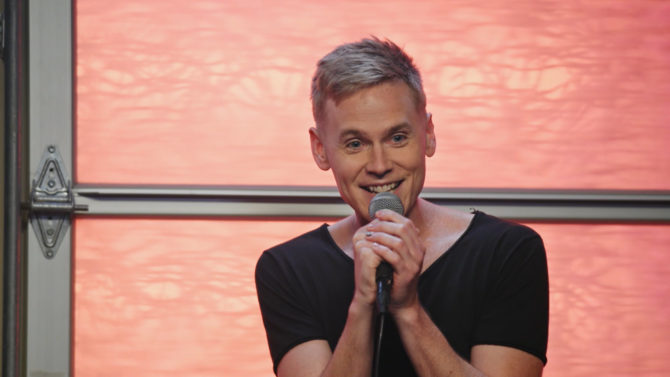
One thing I hear from a lot of comics, and in particular, women—of all races, genders and sexual orientations—is how bigoted comedy can be, and how tough comics can be on each other. Have all of you experienced a lot of homophobia?
ZNT: The most homophobia I’ve experienced has been in open mic settings. Comics who are beginners, who don’t know their voice, comics who are using shock value to get attention—the professionals I’m around are successful for a reason. They’re appealing to most people. We live in a day and age, thankfully, where people with narrow-minded perspectives are being called on it and they’re not being supported by the community. For the most part, a lot of professionals have turned their back on Louis C.K. because of his actions.
JG: We have a big problem when Louis is saying what he’s saying on stage. When people who have found success and have a big platform get up there and spread hate, that’s a problem. When you’re at an open mic night, it’s pretty laughable. What I’ve found is that among the people that I respect there is a very progressive and protective community among comedians.
How so?
JG: For example, at the open mic where I saw Zach perform for the first time—I was there recently. A comic got up on stage and started going off on gay people in a not funny way. After he got off stage he walked over to his group of guys and they all were like dude, what the hell? It was really great to see that because you hear about all the homophobia in comedy—and it is there. But to watch him try to sh*t on gay people, get no response, and then get set straight by his friends immediately, that was pretty cool. It made me feel like things are getting better, at least in my community.
Right.
ZNT: That’s a good sign to me. It does get better the more professional you get.
GB: When I first doing stand up, I started in New York. I’ve been saying this for years now, but whenever I would go to just a regular show—just a run-of-the-mill, nothing queer—I felt like any part of my identity could be up for attack. Being a woman, [other comics] would be like, Hey, don’t you have dishes to do? Or being black, Hey smile so I can see you. And I was like, Are we still doing that? So it was all those things—insulting people, calling people fat—all those things. And I remember thinking, This is going to be tricky. And it was.
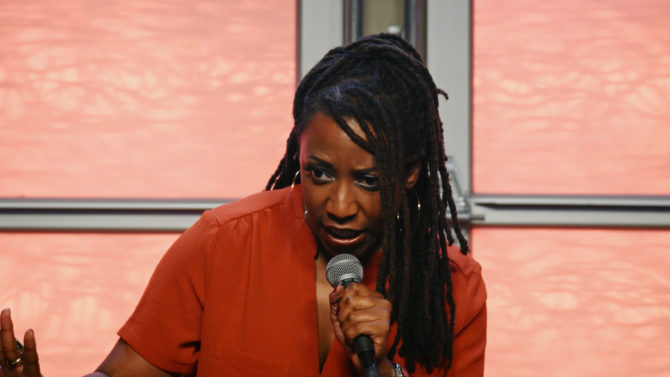
I would imagine.
GB: But over time, after 10 years, I feel like there’s less of that. Also, I feel like depending on the kind of room you’re in, people are just more aware of what’s going on.
Is it different, for you, performing for a queer crowd as opposed to a mix or mostly straight crowd?
ZNT: It’s so…
GB: It is…
ZNT: This has come up so much.
GB: I did a men’s cruise, an RSVP cruise, and had one of the best sets of my life. I think there’s just something about being around my own folks that makes me feel super relaxed. I just want to have a great time [with an audience]. That’s how I feel. And I can feel we’re going to have a good time. Sometimes when got to an audience that has straight folks in the audience. I did a show at The Improv, and it was a really mixed crowd. And I say to myself, They may not go with you. And they did…
GB: But in my head, I had to realize there might be a little understanding we gotta get to first. They got to get through the black stuff, they gotta get through the woman stuff, then they gotta get the gay stuff, and they gotta get over that too.
ZNT: I’m used to be performing not only as the only gay person on a lineup but for a crowd that is 98-99% straight. So there is a lot of fear for me so often performing in front of gay people because a lot of my jokes are written to surprise a straight audience.
Interesting.
ZNT: I’m banking on them not knowing what a top or bottom is.
[Laughter]
ZNT: It gets to shock them. They’re seeing something and hearing something they haven’t heard before. Those jokes don’t work for gay men. I have a joke about sending a pic of my assh*le to someone and it floors straight audiences. But gay audiences are like, Yeah, and? There’s a lot of code-switching that has to happen in order for a joke to work in front of any room.
And I did see that…the joke, not your actual ass.
ZNT: All in due time!
[Laughter]
All three of you, your comedy deals with some really dark stories—substance abuse, racism, homophobia, bad relationships. I’ve heard it said comedy is cruelty. What is it about the pain of life that lets you find humor in it?
JG: Wow, what do I think about that?
ZNT: I think that’s always been one of my coping mechanisms. Humor is so, so important to healing. Comedians make people feel less alone, and they make light of heavy things, because what’s the alternative? Sinking deeper and deeper into depression? Why not choose to find the humor in a situation. Someone told me that comedy is misery plus time. So yeah, showing someone in the aftermath of getting hit by a car is very sad, but if you say, I got hit by a car in one sentence, it’s kind of funny.
Related: Madonna Makes Her Stand-Up Comedy Debut, But We Laughed More At Her New Song
JG: For me, it just felt like before I started doing drama, I wanted people to take me seriously. And I wasn’t getting that from anyone, ever. I started to realize that people really responded [to me] when I told them about things that were hard, or that didn’t go well for me. Then they would want to share back with me stories about themselves. That’s where it started from—these conversations that made me take charge of the narrative. So anything bad that happened became something that would bring me closer to people.
GB: I remember being in therapy in grad school and just lamenting my whole situation. I was like this is hard. I’m black, I’m queer…sh*t is hard! And then when I found stand-up, I realized this is a way for me to exorcize all that stuff and feel empowered. I remember like maybe two or three years in, I got a Facebook message from my therapist…
[Laughter]
GB: Weird, I know. But she said, “I saw your stand-up, and it looks like you figured out a way to deal with a lot of the stuff we talked about.” And it’s true.
There’s also—and I’m not sure what this says—a different level of introspection with queer comics. I see that with other queer comics as well—Margaret Cho, David Sedaris, Hannah Gadsby—all come to mind. For each of you, where does that come from?
ZNT: I guess, growing up gay in the Midwest, I was very aware of how I fit into a society that didn’t quite accept me. So since childhood, I’ve been introspective. I’ve been good at reading a room. Not to be dramatic, but in some ways, it was necessary for survival. It was acting more masculine when I saw that I was in danger of being bullied, or making a joke about myself before the mean kid in class could. It comes from pain, but it was a way to get by. Now I’m using it to my advantage.

JG: For me, the jokes that I write today are the things that I wanted to hear from anyone 10 years ago. I wanted so bad to be taken seriously, I felt like I was constantly getting undercut and laughed at. So once I started to take control of it and lean into it, I realized that there was power in that. That feels good. Life was going to deprecate me whether or not I allowed myself to do it.
GB: I think the nature of comedy should be, and often is, introspective. Because what we are doing is breaking things down and looking at it and examining it. A lot of our stand-up, and not just the people you are talking about, isn’t just observational, it’s anecdotal. So we’re taking our own experiences, breaking them open, examining it and finding the humor so it doesn’t have as much damage.
Because you do share such intimate stories about dating or your sex life, do you ever get dates from audience members of your show?
GB: Yeah, and I’m like, Why do you like damaged people?
[Laughter]
GB: I do, and I don’t ever do anything about it.
JG: Let’s see, can I share this with you? What the Hell. My very first show in a gay bar, it went really well and it was a lot of fun. Afterward, I met one of the gogo dancers who had seen my set, and we started talking. And we hooked up, and that was fun, and it made me feel like a true-blue American comic. I’m performing in a bar and going home with the waitress.
[Laughter]
JG: Maybe in the last year that’s been happening more often, but definitely not to the extent that straight male comics experience. But that’s a relief. I go to open mics all the time. I’m there to see my friends and work on my material. Performing is already overwhelming without making someone try to fall in love with you, or avoid someone you don’t ever want to see again. But it’s fun. When someone meets me from performing, they get to see a part of me that I want everyone to see.
Out on Stage premieres on Dekoo January 17. Check out an exclusive clip of Gloria Bigelow’s set.



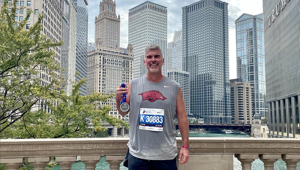
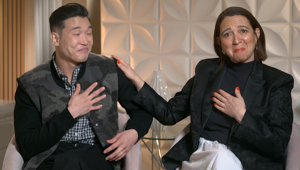









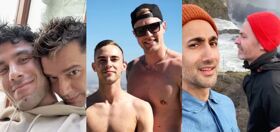

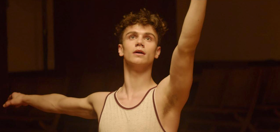
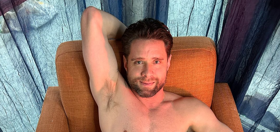
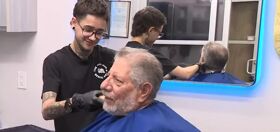
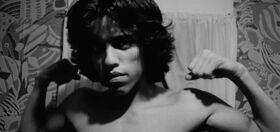
[email protected]
Um..how can he be pictured, right, if there is only one in the picture? Need some editing before posting your articles. That or go back to school and start over in the third grade. Silly boy.
Thad
Could Zach Noe Towers please host the Oscars?
alterego1980
Ugh. My only issue with this article is the “click-bait” headline. I am lucky that I actually clicked because I almost didn’t!! It was a substantial and interesting deep dive into lgbtq comics and I thoroughly enjoyed it. Please, please, PLEASE give these comics their due and write a more representative headline!!